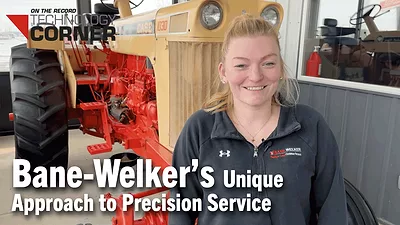Manufacturers are emphasizing tech training beyond precision farming specialists.
Jack Zemlicka, Technology Editor
As precision farming technology rapidly evolves, equipment dealerships continue to develop or grow their precision specialist departments to meet customer need.
But keeping pace with growers’ thirst for precision technology is an ongoing challenge.
Several machinery manufacturers told Precision Farming Dealer at the recent Farm Progress Show that even those dealerships with the most skilled precision farming experts can be stretched thin.
“This explosion of technology has come on so fast, most dealerships haven’t been able to catch up as quickly as the grower who sits on his laptop and studies it for hours at a time,” says Luc van Herle, global sales manager for Kinze Manufacturing. “We’re kind of in an awkward in-between stage right now.”
To give their dealers more flexibility in servicing and supporting precision products, Kinze and other manufacturers are emphasizing technology training beyond just precision farming specialists.
Starting last fall, Kinze began a widespread effort to train all sales and service professionals at its dealerships on ISOBUS compatibility — or “plug and play” technology with tractors — for the manufacturer’s new line of planters, which debuted this summer.
The goal of the training, van Herle says, is to broaden the capability of their dealers to service the ISO-technology associated with Kinze planters.
“We bring them all in and they sit through our ISO training whether they like it or not,” he says. “But when they walk away, they say, ‘That wasn’t as hard as I thought.’”
While hiring a precision farming specialist is a good first step for dealerships, it can’t be their only one, van Herle says, and every technician in the store needs to be technology savvy.
Without expanding training, dealerships risk falling behind their customers in being able to troubleshoot precision technology problems — and that will eventually hurt business — he says.
“You can’t have all your business funneled through one person,” van Herle says. “Then that person becomes the limiting factor because there’s only so much of him or her to go around.”
But manufacturers recognize that dealerships don’t have the capacity or time to get the average equipment mechanic fully educated on the latest RTK base station model or telematic innovation.
However, that also doesn’t mean traditional service mechanics cannot benefit from the advanced technology.
Software like Case IH’s recently updated Advanced Farming Solutions (AFS) allows farmers to electronically communicate with dealers to better diagnose problems and get service faster.
“Instead of having to drive two hours only to bring the wrong part, a mechanic can get the diagnostics report or know exactly where that machine is in a field,” says Trevor Mecham, Case IH AFS marketing manager.
The end result is a simplistic, efficient use of time by the dealer, rather than forcing the customer to wait to hear back from a precision farming specialist.
“Our dealers can’t be just guys who are turning wrenches, so to speak,” says Mecham. “Our wrench-turning days are becoming more virtual and mechanics need to be a part of that equation.”
In some cases, that participation comes reluctantly, van Herle says, but ultimately dealers should realize the value of widespread precision technology training.
Long-term, the expansion of precision training to include the entire sales and service departments is a step toward making equipment dealerships a “one-stop solution” for customers, van Herle says.
But for now, broader training will help keep dealers ahead of customers in terms of precision knowledge.
“If I was operating a store, and I have many friends who do, I tell them every technician you have, every sales person you have, has to be technology savvy,” van Herle says. “You should know more about it than the customer does. Right now, I venture to say in many instances the customer knows more about it than the dealer does.”





